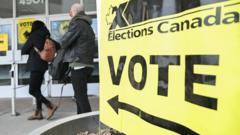Canadians are set to vote in a critical election Monday that has been heavily influenced by US President Donald Trump's rhetoric and policies. Earlier this year, the Conservatives were predicted to dominate the election, but Trump's imposition of tariffs and comments suggesting Canada might become the "51st state" stirred nationalism and reshaped the political landscape.
Final pre-election polls indicate that the Liberals, led by incumbent Prime Minister Mark Carney, hold a slight edge in the race, although the competition has narrowed in recent days. This comes in the wake of a tragic incident—a car ramming attack during a local festival in Vancouver that resulted in 11 fatalities—forcing party leaders to address the nation and adapt their campaigning strategies in response.
In the midst of these developments, Carney, who served as a central banker during significant economic crises, emphasized the need for Canada to align with other "reliable trade partners" in reaction to Trump's aggressive stance. He framed his candidacy as a bulwark against what he described as an existential threat posed by the US leader's administration.
Amidst the backdrop of rising community nationalism and deepening concerns about the future relationship with the US, Poilievre seeks to galvanize support by highlighting the challenges of living under the Liberal government, citing issues such as rising housing costs and crime. He portrayed himself as the candidate for change, aiming to unseat the ruling party amidst economic dissatisfaction.
While major parties including the Liberals and Conservatives dominate the narrative, smaller parties have struggled to gain traction. This includes the left-leaning New Democratic Party (NDP), led by Jagmeet Singh, who faced challenges after the Vancouver attack and the Bloc Québécois, which focuses primarily on Quebec.
As the election unfolds with an unprecedented number of advance ballots already cast, the outcome could significantly reshape Canada's political and economic future, especially with looming questions about international relations under the influence of US policies. Voting will commence sequentially across six time zones, concluding with the latest polls closing in British Columbia tonight. With more than 7 million Canadians already participating, the stage is set for a landmark election shaped by both local and global dynamics.




















